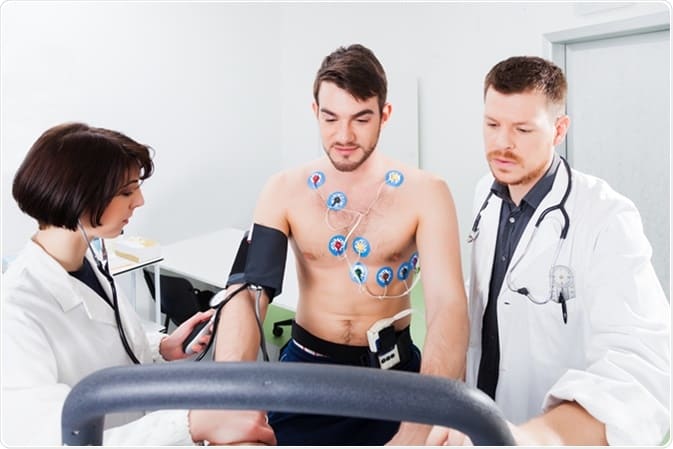Nuclear Stress Test
You may need a nuclear stress test or Cardiolite if you have signs or symptoms of heart disease such as chest pain or shortness of breath. A nuclear stress test may also be used to guide your treatment if you've been diagnosed with a heart condition. Your doctor may recommend a nuclear stress test to diagnose coronary artery disease. Your coronary arteries are the major blood vessels that supply your heart with blood, oxygen and nutrients. Coronary artery disease develops when these arteries become damaged or diseased — usually due to a buildup of deposits containing cholesterol and other substances (plaques).
If you have symptoms such as chest pain or shortness of breath, a nuclear stress test can help determine if you have coronary artery disease and how severe the condition is.

How nuclear stress test works
Nuclear stress test is an imaging method that uses radioactive material to show how well blood flows into the heart muscle, both at rest and during activity.
A nuclear stress test is one of several types of stress tests. The radiotracer used during a nuclear stress test helps your doctor determine your risk of a heart attack or other cardiac event if you have coronary artery disease. A nuclear stress test may be done after a regular exercise stress test to get more information about your heart, or it may be the first stress test used.
How should i prepare for this procedure?
Your doctor will give you specific instructions on how to prepare for your nuclear stress test.
You may be asked not to eat, drink or smoke for a period of time before a nuclear stress test. You may need to avoid caffeine the day before and the day of the test.
Ask your doctor if it's safe for you to continue taking all of your prescription and over-the-counter medications before the test because they might interfere with certain stress tests.
If you use an inhaler for asthma or other breathing problems, bring it to the test. Make sure your doctor and the Nuclear Technologist monitoring your stress test know that you use an inhaler.
Wear or bring comfortable clothes and walking shoes. Don't apply oil, lotion or cream to your skin on the day of your nuclear stress test.


What will i experience during the procedure?
A nuclear stress test involves injecting a radioactive tracer, then taking two sets of images of your heart — one while you're at rest and another after exercise.
You will receive a drug/medication through an IV that mimics exercise by increasing blood flow to your heart. The test will take two or more hours, depending on the radioactive tracer and imaging tests used.
When the test is complete, you may return to normal activities unless your doctor tells you otherwise. The radioactive tracer will naturally leave your body in your urine or stool. Drink plenty of water to help flush the tracer out of your system.










